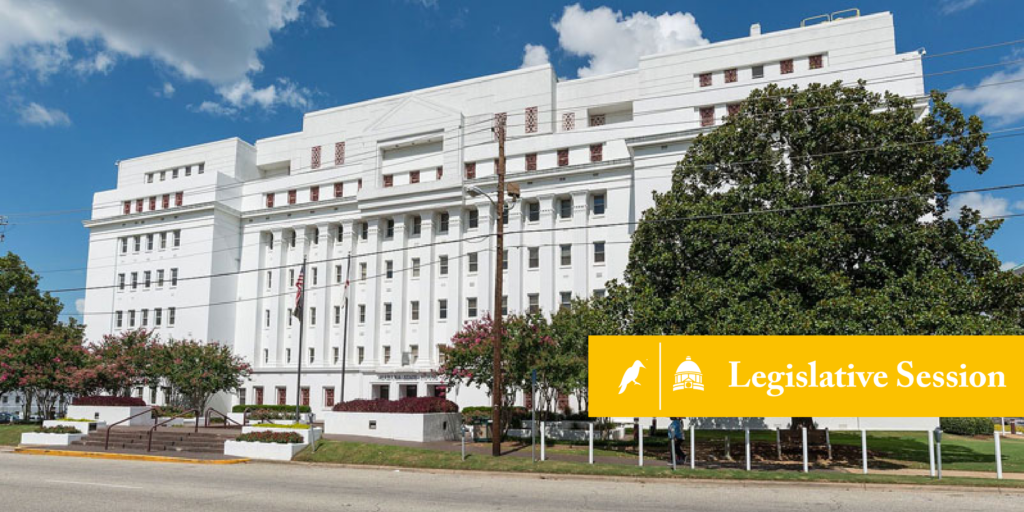The Alabama Policy Institute, the leading conservative think tank in Alabama, recently released its 2024 Blueprint for Alabama ahead of the 2024 state legislative session, which begins February 6.
API is celebrating its 35th year of operation. The group says it is committed to policies promoting free markets, limited government, and strong families. API listed 30 legislative priorities they would like to see the Legislature address in 2024.
The first of these in the blueprint is ending home equity theft. Home equity theft is the legal authority of government entities and private investors to seize citizens’ property for failing to pay a property tax debt.
According to the Pacific Legal Foundation, between 2014 and 2021, 169 homeowners lost property worth $4.3 million because of unpaid property taxes. API argues that any amount received in a tax sale above and beyond the debt should be returned to the consumer and not kept as profit by the government.
RELATED: 2024 will be ‘very busy session’ for lawmakers, Pro Tem Reed says
API is also arguing for capping property tax increases. Due to loose federal monetary policies, rising immigration rates, and a limited supply of new housing, many homeowners have seen their home valuations soar. Governments have profited from this by raising the taxes paid on existing homes, making it much more difficult for homeowners to pay the taxes on the house they bought ten years ago – in some cases, for half what it is worth now. API is urging the Legislature to put statutory caps on how much county property assessments can increase in any year. Seventeen states already have this place.
Fiscal Year 2023 was outstanding for the State of Alabama.
The economy boomed, unemployment was down, wages were up, and considerable surpluses in tax dollars were rolled over to FY2024 on October 1. The education trust fund (ETF) and state general fund (SGF) budgets produced nearly $13.7 billion in 2023 – a record for Alabama.
Legislators will have to figure out how to spend an estimated $2 billion in carried-over surpluses when they meet for the regular session in three weeks. API opposes using those funds to further increase the size and power of state government, favoring tax cuts and responsible fiscal policy over further growing the size and scope of state government.
One area where API is likely to be in opposition to some House Republicans is in the area of gambling. API announced in its blueprint that it would oppose any efforts to put the question of legal forms of gambling or a state lottery to Alabama voters to decide in a constitutional amendment referendum.
API writes, “any meaningful economic gains would be realized from expanding gambling is questionable at best. The negative societal impacts that expanding gambling and creating a lottery would bring are undeniable.”
API supports steps to increase election security in the state and ensure Alabamian’s rights to elect the candidates of their choice. They argue that government legitimacy depends on public confidence in electoral and political processes.
RELATED: Sec. Allen: Eliminating ballot harvesting will ‘protect’ absentee voting
API urged lawmakers to pursue bolder tax reform initiatives in the 2024 regular session, allowing citizens to keep more of their hard-earned money and make the state more competitive in attracting new residents and business opportunities to Alabama.
The Blueprint calls for the Alabama Legislature to stop the practice of the state government facilitating payment of membership dues to public sector unions.
API also reiterated its opposition to Medicaid Expansion.
Alabama is currently one of just ten states that have not expanded Medicaid. API warns that the long-term impacts on the state general fund budget, the state’s lagging labor participation rate, and the state’s ability to run the Alabama Medicaid program are all concerns that should lead to lawmakers continuing to resist Medicaid expansion.
API warns that the costs of the federal Medicaid program are projected to grow by nearly 54% over the next ten years and will continue to rise in subsequent decades.
RELATED: School Choice Week: Alabama leaders promise to ‘continue the fight’
The Blueprint calls for more school choice options in the state, writing that, despite record Education Trust Fund budgets over the past decade, Alabama continues to lag behind much of the nation in test scores, and Alabama’s students continue to fall further behind in terms of academic achievement.
The Blueprint calls for occupational licensing reform.
Alabama currently licenses 151 occupations, covering nearly half a million workers. They claim that obtaining those licenses is burdensome for many individuals, particularly low-wage earners. Initial licensing fees can exceed $1,000, and numerous state licensing boards require annual renewals. Alabama workers spend $167 million a year on occupational licenses. Continuing education requirements are an added $243 million a year that workers pay to participate in the economy.
RELATED: Leading ethics law scholar addresses lawmakers ahead of 2024 reform effort
API is calling for loosening restrictions on home-based businesses. These restrictions include costly zoning and licensing requirements by local governments. Industry-specific barriers are also used to prevent business owners from serving their clients from home. API writes that Alabama businesses that have no impact on the health and safety of their local communities and do not pose the risk of creating a public nuisance should be allowed to operate as freely as possible without unnecessary government interference.
API also supports removing barriers to minor work authorization to make it less cumbersome for minors. Under current Alabama law, fourteen- and fifteen-year-olds are permitted to work a limited number of hours per week. Still, they must obtain eligibility to work form from their school stating that they have been in regular attendance and making acceptable progress. Whether a fourteen- or fifteen-year-old is mature and responsible enough to work while also attending school should be decided by the child and their parents, not school administrators, the Blueprint states.
API supports increasing the age of majority to consent to medical treatment so that parents have the right to have a legal say in the medical care received by their children. Under current law, with exceptions, any child aged fourteen or older can legally make their own medical decisions. API supports legislators raising the age of majority for medical decisions to ensure parental rights.
RELATED: Is Alabama feeling lucky about gaming in 2024?
API supports placing restrictions on abortion-inducing drugs. Alabama has already passed the Human Life Protection Act, which bans post-fertilization abortions in the state under most circumstances. API is calling for legislation to ban the sale and use of abortifacients.
API is calling on lawmakers to ensure that federal guidelines relating to healthcare price transparency are being followed, allowing Alabamians to know the true costs of healthcare services before receiving treatment. This could include codifying federal law and allowing the state further to penalize noncompliant hospitals with the federal price transparency rule. They also support policy reforms that incentivize and reward patients for choosing lower-cost but high-quality alternatives to the traditional health insurance payment model.
API is also in favor of prohibiting sexually explicit performances in public. Parents should not have to worry about their children being exposed to inappropriate displays of sexual conduct at public libraries, restaurants, parks, etc.
API is also in favor of legislation to protect minors from age-appropriate library materials, saying this issue is not a question of censoring libraries or banning books — instead, it is about whether books being made available to children are appropriate for their age level.
API called on Alabama lawmakers to evaluate the current system for approving, categorizing, and distributing books at public libraries. Reforms should be made to protect children from access to questionable books.
The blueprint also calls for the creation of a state childcare tax credit.
One factor contributing to Alabama’s stagnant labor participation rates is parents’ difficulty finding access to quality and affordable childcare, API asserts.
For parents of young children, access to childcare is one of the most considerable barriers to entering and staying in the workforce and being able to perform their job duties without interruption, API stated. They said this is an affordable first step that lawmakers should consider seriously.
RELATED: Livingston: Ballot harvesting, school choice among 2024 legislative priorities
API also urged the Legislature to end DEI (Diversity Equity & Inclusion) programs at public higher education institutions in the state. Throughout the U.S. and at home in Alabama, progressive DEI ideologies have a pervasive influence on major public and private entities. This ideology is often couched in the DEI policies and departments of corporations and universities API claimed.
API advocates for education transparency through legislation requiring parents to access the curriculum and teaching materials utilized in their child’s public school classroom. This extends to things such as what books are in the school’s library and required reading lists.
API also favors hiring chaplains to serve in public schools to bring a faith-based approach to help alleviate mental health worker shortages. Texas has already enacted legislation to allow school districts to hire chaplains specifically. Allowing chaplains to work in Alabama’s schools could benefit employees and students alike. So long as chaplain services are optional, they should not run afoul of the United States Constitution API stated.
The full report is available here.
To connect with the author of this story or to comment, email brandonmreporter@gmail.













